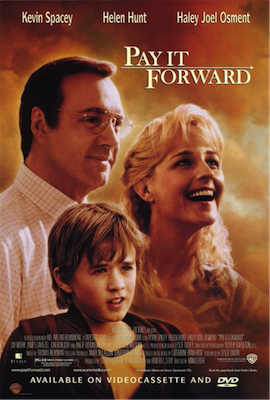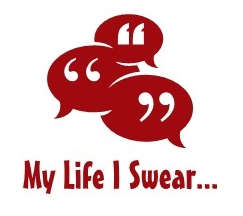This week, we share a guest post from blogger Erin Cooper Reed!
While working as a waitress at a family restaurant in my home town, I witnessed a genuinely kind gesture.
That night, after returning home from work, I felt compelled to write about it.
I logged onto my personal Facebook page and began typing.
“Tonight, a young couple, seated at the center table, called me over and asked to pay for an elderly man’s meal. After paying the man’s check, they finished their dinner and left the restaurant without saying a word. When the elderly man, who had been dining alone, asked for his bill, I told him that it was paid for by another guest. He was obviously surprised and the look on his face was one of both joy and gratitude. He felt special.”
I ended my post by saying, “Let’s all take the lead of the people at the center table and perform an anonymous, random act of kindness. I know I will.”
Exhausted from a long shift, I closed my laptop and went straight to bed.
The following day, I awoke to an early morning phone call from my boss. My boss knows that I am a writer, but it is something that we rarely discuss, so I was confused when I picked up the phone and he asked…
“Did you write something last night?”
I tried to rub the sleep out of my eyes while I wondered why in the world my boss was calling me at 8:00 am to ask me what I had written.
Before I could answer his question, he said, “It’s all over the internet.” Then he hung up the phone.
I grabbed my laptop and typed in the name of the local news patch. There was my Facebook post, and a caption that read: ANOTHER PAY IT FORWARD STORY.
I was shocked that such a small gesture, with no real monetary value, had made the news. I was proud that it was my perspective on the gesture that gave the story importance.
It reminded me of the film, “Pay It Forward”.

I think you would be hard-pressed to find a person who isn’t familiar with the famous tagline, “Pay It Forward” - even if they weren’t aware it was a movie title in the year 2000.
Seventeen years later - television news, print and online publications, as well as social media outlets, continue to report stories of random acts of kindness. Like…
A customer has their grocery bill paid for by a stranger in line.
A waitress is left an exorbitant tip by an unknown patron.
Has something like this happened to you?
I love to read and share these feel-good stories. Maybe you have even asked yourself, what “act of kindness” you could do for another human being.
I know that not everyone has the means to leave an extremely large tip at a restaurant or to pay for another person’s grocery bill… but kindness isn’t always about payment - sometimes, kindness is simply about one small gesture .
The whole idea has me pondering the act of kindness.
“Paying it forward” kindness is revered due to the selfless nature of giving something to a complete stranger, often in an anonymous fashion. However, I think what might often be forgotten is - while kindness can certainly be distributed through an act , kindness is at its simplest, a gift .
The gift of kindness.
Look at the nature of young children. They embody gentleness and compassion. I find myself touched by their innocence and stand in awe of their simple beauty. Why, as adults, have we forgotten the importance of kindness?
While we should all strive to “pay it forward” and pass on random acts of kindness to strangers, are we forgetting to practice the gift of kindness with the people we love in our everyday lives?
The beauty of the gift is in its simplicity .
Not always wrapped in large monetary denominations, and yet so simple, it may never make the headlines of a news story.
So how can we practice the simple gift of kindness in our everyday lives?
1. Recognize that kindness starts within ourselves.
The first place to practice the gift of kindness is within ourselves. Manage your self-talk - if your thoughts about yourself are harsh ( “You’re so stupid!” ) or judgmental ( “You’ll never be able to get that promotion!” ), take a moment to realize that being kind to yourself first is key to being kind to others. Being kind to yourself will in turn spread kindness to other people in your life.
2. Make it a point to use the word “kind” in your daily life.
Take a minute and think about how often you use the word “kind” in your typical daily conversations. If a colleague were to ask you to describe a friend - what would you say? “She’s pretty, smart, or successful.”
How often would you use the word “kind” to describe someone? I don’t hear the word “kind“ being used all that often in my daily life, and it may very well be eliminated from the English language if we don’t try to use it more often! Start to use the word “kind” when speaking to others. Being kind begins with the awareness that kindness should be spoken of, recognized, and important in our daily lives.
3. Kindness is in the details.
Practicing the gift of kindness does not have to be a one-time major event. Living a life through kind gestures gives you the opportunity to use your gift of kindness and to set an example for your family to use theirs. Pay attention when people speak and listen with your heart.
If your grandmother mentions that she loves her antique footstool, even if the fabric is worn to shreds, take it to be reupholstered and surprise her with her treasured stool redone. Pay attention to the small details and the opportunities they offer to spread the gift of kindness.
4. Kindness is learned at home.
You may ask your children to be “nice”, or to “be polite” but how often do you ask them to be “kind”? Are we teaching our children the importance of being kind?
Kindness is learned by the examples that we set. Get up 10 minutes earlier to make your spouse their morning coffee and serve it to them in bed.
Bring your neighbor some fresh-cut flowers from your garden. Let the businesswoman on her lunch-hour go ahead of you in line at the store. Hold the door. Offer a smile. Start a conversation with the old man who’s dining alone. Know all the little, non-newsworthy gestures of kindness, are the gifts that matter most.
Maybe, one day, you will overhear your son or daughter describe you as a “kind person” . Wouldn’t that be the ultimate compliment? The gift of kindness is a gift that you give of yourself, and a gift that you will ultimately receive in return.
What are your thoughts on kindness and what can you do to practice the gift of kindness in your day-to-day life? Leave your thoughts in the comments section below :)








